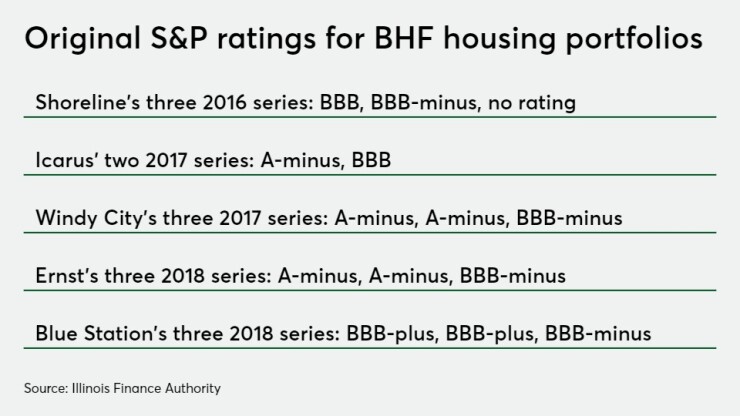Stung by the taint of serving as conduit for five defaulted Chicago-area affordable housing bond portfolios that were issued with investment-grade ratings, the Illinois Finance Authority has some advice for S&P Global Ratings.
The IFA weighed in as part of S&P's commentary process for revisions to its criteria for rating housing bonds like the $169 million sold on behalf of the Better Housing Foundation.

As the state’s lead’s conduit agency that issues tax-exempt bonds on behalf of not-for-profit hospitals, higher education institutions, and some local governments, the IFA is no stranger to defaults despite an internal review process and the employment of financial advisors, and it acknowledges those blemishes.
But authority officials are frustrated with the precipitous fall the bonds took from their issuance between 2016 and 2018 with investment-grade S&P ratings to default last year.
“A very short time after the closing of each bond transaction, the housing projects financed by these bonds experienced rapid and significant physical and economic deterioration that led to defaults, impairments and ratings downgrades, culminating in ratings withdrawals,” IFA executive director Christopher Meister wrote to S&P’s housing sector lead Marian Zucker.
The three Chicago-based portfolios — Ernst, Icarus, and Shoreline — defaulted in June and the two suburban based portfolios — Blue Station and Windy City — followed in December. One of the Chicago’s portfolios is now the subject of a
“These events and their consequences have been well-documented in both local and trade media. These events have also led to litigation involving the authority,” the letter shared with the IFA board at its January meeting says. “These events have adversely impacted the authority’s reputation, exposed bondholders to financial loss and, most importantly, have catastrophically impacted residents of these projects as well as their adjacent residential properties and neighborhood communities.”
Meister added in an interview that it’s a rare occurrence for the authority to submit such a letter. It was driven by the “magnitude and speed of the failures and the sheer volume of inquiries that we’ve received from the media, from Freedom of Information Act requests, and from bondholders,” he said.
“It harms the authority every time there is a story. The authority is deeply disappointed in the borrower's failure to meet its contractual obligations,” Meister said.
The IFA acknowledges that given its status as a conduit it lacks modeling and forecasting expertise or the causes of the BHF properties’ deterioration and is not in a position to suggest specific improvements to the methodology process.
It does, however, urge analysts to consider various factors in their review “to avoid, to the extent reasonably possible, rapid and catastrophic situations and ratings downgrades similar to those experienced in connection with the Better Housing Foundation properties.”
The elements the IFA suggests should be considered in the ratings methodology include increased debt service coverage on projects; increased reserve funding for each project; increased focus on the management capacity; requiring audited financial statements on the underlying properties; the extent to which the borrower outsources its project duties; and the financial capacity of the borrower to fund unplanned maintenance and operating expenses in order to avoid adverse consequences to project residents, adjacent residential properties, neighborhood communities and bondholders.
S&P can’t comment on the IFA’s specific submission, but Zucker said the rating agency welcomes all input.
“S&P Global Ratings encourages an open and transparent dialogue with market participants, which is one of the reasons we issued on November 4, 2019, a request for comment for new criteria” establishing the Methodology for U.S. Public Finance Rental Housing Bonds to replace the Methodology and Assumptions for Affordable Multifamily Housing Bonds” that dates to 2014, she said in an emailed statement.
“As part of our process for criteria changes, we welcome the submission of written comments and are encouraged to see the level of engagement and comments we received during the comment period, which closed on December 18, 2019,” she said. “We are in the process of reviewing and considering all the comments we received. When we do publish our final criteria, we will also post these comments to our website.”
In the latest development, BHF affiliate Lindran Properties LLC filed bankruptcy late last month and is seeking the sale of $13.6 million of the Shoreline portfolio housing stock in a bid process that begins at $3.9 million sale price. UMB Bank NA is the successor trustee on all five portfolios, having taken over from Wilmington Trust NA.
The fate of and potential recovery rates for the other portfolios remain uncertain, as some are in better shape than others and are occupied and generating revenue, while others are mostly vacant and in disrepair, are behind on tax bills, and owe a housing receiver costs. All options remain on the table as bondholders seek to recoup their investments and that could involve future lawsuits alleging fraud, according to bondholders.
The Chicago-based portfolios stumbled out of the gate with reports of code violations, dwindling occupancy, and the loss of Chicago Housing Authority voucher payments.
BHF president Andrew Belew said the foundation continues to make the payments needed to cover debt service and it wasn't a shortage of funds that drove the suburban defaults. The properties are more than 80% occupied.
The Shoreline bonds recently traded this week at 22 cents to 23 cents on the dollar, according to trade data on the Municipal Securities Rulemaking Board’s EMMA website. The Chicago-based Ernst bonds traded last month at 27 cents on the dollar while the Chicago-based Icarus traded late last year at 30 cents on the dollar. The suburban Blue Station and Windy City portfolios are trading at 50 cents on the dollar.





